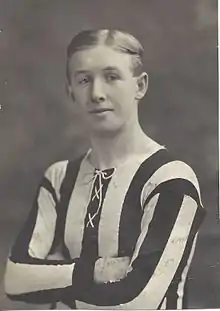Scott Duncan (footballer)
Adam Scott Mathieson Duncan[1] (2 November 1888 – 3 October 1976) was a Scottish footballer and manager.
 Duncan with Newcastle United in 1908 | |||
| Personal information | |||
|---|---|---|---|
| Full name | Adam Scott Mathieson Duncan | ||
| Date of birth | 2 November 1888 | ||
| Place of birth | Dumbarton, Scotland | ||
| Date of death | 3 October 1976 (aged 87) | ||
| Place of death | Scotland | ||
| Position(s) | Outside right | ||
| Youth career | |||
| Dumbarton Oakvale | |||
| Dumbarton Corinthians | |||
| Clydebank Juniors | |||
| Shettleston Juniors | |||
| Senior career* | |||
| Years | Team | Apps | (Gls) |
| 1906–1908 | Dumbarton | 30 | (2) |
| 1908–1913 | Newcastle United | 73 | (10) |
| 1913–1919 | Rangers | 101 | (26) |
| → Celtic (guest) | 2 | (0) | |
| 1918–1920 | Dumbarton | 28 | (2) |
| 1920–1922 | Cowdenbeath | ? | (?) |
| 1922–1923 | Dumbarton | 0 | (0) |
| Teams managed | |||
| 1923–1925 | Hamilton Academical (secretary) | ||
| 1925–1932 | Cowdenbeath (secretary) | ||
| 1932–1937 | Manchester United (secretary) | ||
| 1937–1955 | Ipswich Town | ||
| * Senior club appearances and goals counted for the domestic league only | |||
Career
Playing career
Born in Dumbarton, Duncan was working as a law clerk when he joined his home-town club Dumbarton in 1906.[2] He moved to Newcastle United in March 1908 for a fee of £200. A versatile forward, although primarily an outside-right, he scored 12 times in 81 league games for the Magpies and was a member of the 1908–09 Football League championship winning side.
In May 1913, he returned to Scotland, moving to Rangers for a fee of £750. He remained with Rangers during World War I, in which he served as a signalling instructor in the Royal Field Artillery. He also played two wartime games for Celtic. In 1918 he rejoined Dumbarton and in the 1920 close season signed for Cowdenbeath. In 1922 he rejoined Dumbarton for a third time, but retired at the end of the 1922–23 season.
Managerial and coaching career
Duncan was appointed as secretary-manager of Hamilton Academical in the summer of 1923. He left in October 1925 to take over as secretary-manager of Cowdenbeath and had seven successful years at the club, keeping them in the Scottish First Division throughout his time in charge.
In June 1932 he was appointed as secretary-manager of Manchester United. Despite spending a lot of money on players, United were almost relegated to the Third Division in the 1933–34 season. However, Duncan turned things around and led United to the Second Division championship in the 1935–36 season. However, they were relegated the following season and, in November 1937, he resigned to become manager of Ipswich Town, who were then a Southern League side.
At the end of the 1938–39 season Ipswich were elected into the Football League despite finishing third in the Southern League. Duncan remained with Ipswich Town as manager for 18 years, winning the Third Division (South) title in the 1953–54 season. However, Town were relegated the following season and Duncan stood down as manager in August 1955 season when Alf Ramsey took over. He remained as secretary for three further years.
He was honoured with a testimonial match at the end of the 1957–58 season against Norwich City at Portman Road, which Ipswich won 3–1.
He returned to live in Scotland in his retirement until his death in 1976, at the age of 87.
Honours
Managerial statistics
| Team | Nat | From | To | Record | ||||
|---|---|---|---|---|---|---|---|---|
| G | W | L | D | Win % | ||||
| Hamilton Academical[3] | July 1923 | October 1925 | 88 | 36 | 13 | 39 | 40.9 | |
| Cowdenbeath[4] | October 1925 | June 1932 | 282 | 118 | 49 | 115 | 41.8 | |
| Manchester United | June 1932 | November 1937 | 223 | 88 | 85 | 50 | 39.5 | |
| Ipswich Town | November 1937 | August 1955 | 477 | 199 | 179 | 107 | 41.7 | |
See also
References
- Joyce, Michael (2004). Football League Players' Records 1888 to 1939. Nottingham: Tony Brown. p. 80. ISBN 1899468676.
- Emms, Steve; Wells, Richard (2007). Scottish League Players' Records Division One 1890/91 to 1938/39. Beeston, Nottingham: Tony Brown. ISBN 978-1-899468-66-9.
- Hamilton Academical manager Duncan, Scott, FitbaStats
- Cowdenbeath manager Duncan, Scott, FitbaStats
External links
- Scott Duncan management career statistics at Soccerbase
- Manager's profile at Pride of Anglia (fansite)